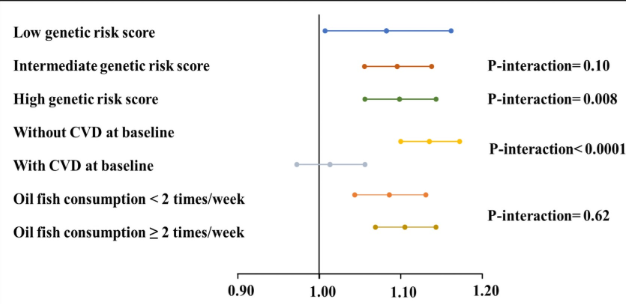
Comment:
This article made a big splash in the media and led to a lot of questions from patients about the safety of taking fish oil supplements. Understanding that this is an observational study, it does show an increase in atrial fibrillation in people who consume fish oil supplements. What’s intriguing, and makes me more suspicious of the findings, is the difference between those with cardiovascular disease (no impact), and those without. Also, there is no difference in risk between those who take it less than twice a week, and those who take it more, whereas I would expect to see some increase with higher doses.
I tend to to point people towards this study, which shows an increase in overall survival from fish oil supplements.
Summary:
Clinical Bottom Line
This large cohort study shows a statistically significant association between regular fish oil supplementation and a small increased risk of developing new-onset atrial fibrillation (AF), particularly in individuals without pre-existing cardiovascular disease. However, as an observational study, it can only identify an association and cannot prove that fish oil supplementation causes AF due to the potential for unmeasured confounding variables.
Results in Context
-
Main Results: Over a median follow-up of 11.1 years, 6.2% of fish oil users developed AF compared to 5.2% of non-users. After adjusting for numerous demographic and clinical risk factors, habitual fish oil supplementation was associated with a 10% higher risk of incident AF (Adjusted Hazard Ratio: 1.10, 95% Confidence Interval: 1.07 to 1.13). The association was present regardless of a person’s genetic risk for AF or their consumption of oily fish from their diet.
Definition: An adjusted hazard ratio of 1.10 means that after accounting for other risk factors (like age, smoking, and hypertension), the group taking fish oil supplements had a 10% higher rate of developing AF at any given time compared to the non-user group -
Key Subgroup Finding: The link between fish oil and AF was only significant in participants without cardiovascular disease (CVD) at baseline (Adjusted HR 1.13). There was no statistically significant association observed in participants who already had CVD at the start of the study (Adjusted HR 1.01).
-
Participants: The analysis included 468,665 individuals from the UK Biobank, of whom 148,192 (31.6%) reported habitual fish oil use at baseline.
Assertive Critical Appraisal
-
Limitations & Bias (STROBE Framework): The primary limitation of any observational study is the risk of confounding. Although the authors commendably adjusted for a wide range of variables (including genetics, diet, and comorbidities), residual confounding from unmeasured or imperfectly measured factors could still account for the modest association observed. Furthermore, fish oil use was self-reported at a single point at baseline, and information on dose, specific formulation (EPA vs. DHA), and duration of use was not available. This is a major limitation, as these factors could significantly influence the risk.
-
Reporting Quality Assessment (STROBE/RECORD): The study’s reporting is of high quality. The authors clearly followed the STROBE guideline by detailing their efforts to address confounding through multivariable adjustment. As the study uses real-world data from the UK Biobank, it also aligns with RECORD principles by providing a clear flowchart of participant selection (Figure 1), defining the data sources, and specifying how exposures and outcomes were ascertained.
-
Applicability: The findings are highly relevant to general clinical practice, where fish oil is a widely used supplement. This study provides important data for counseling patients, especially those without established CVD, about a potential, albeit small, risk of AF associated with supplementation. However, the lack of dosage information prevents clinicians from providing specific recommendations on safe intake levels.
Research Objective
The primary objective was to determine if habitual fish oil supplementation is associated with the risk of developing new-onset AF in a large, real-world population. A secondary aim was to see if this relationship was modified by a person’s genetic risk for AF, baseline CVD status, or dietary intake of oily fish.
Study Design
This was a prospective longitudinal cohort study using data from the UK Biobank database. Participants were enrolled between 2006 and 2010 and followed for a median of 11.1 years to identify new diagnoses of AF.
Setting and Participants
The study included 468,665 participants from the UK Biobank, aged 40-69 years at enrollment, who did not have a diagnosis of AF at baseline.
Bibliographic Data
-
Title: Habitual fish oil supplementation and the risk of incident atrial fibrillation: findings from a large prospective longitudinal cohort study
-
Authors: Junguo Zhang, Anping Cai, Ge Chen, Xiaojie Wang, Miao Cai, Haitao Li, Steven E. Nissen, Gregory Y. H. Lip, and Hualiang Lin
-
Journal: European Journal of Preventive Cardiology
-
Year: 2022
-
DOI: 10.1093/eurjpc/zwac192
This AI-generated analysis is for informational and research purposes only and is not a substitute for professional medical advice, diagnosis, or treatment. Always seek the advice of a qualified health provider with any questions you may have regarding a medical condition.
Original Article:
Full text pdf: here
Open Access This article is published and distributed under the terms of the Oxford University Press, Standard Journals Publication Model (https://academic.oup.com/journals/pages/open_access/funder_policies/chorus/standard_publication_model)
